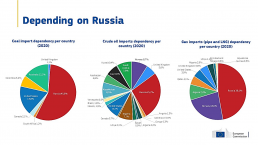Energy Security, Sovereignty and Resilience
War is back in Europe. In addition to immense human suffering, the Russian invasion of Ukraine in February 2022 has also put energy security on top of the political agenda of the European Union and its Member States. After all, energy is conditio sine qua non for human life and all economic activity. Energy security is of existential importance. It is given if “adequate, reliable supplies of energy at reasonable prices” are assured “in ways that do not jeopardize” one’s own major “values and objectives” (Daniel Yergin, Foreign Affairs, 1988). The actual ability – and not merely the formal power – to decide autonomously and free from external coercion on one’s energy security can be termed as energy sovereignty. An energy system is only resilient if it can absorb external shocks, secure energy supplies and preserve energy sovereignty. However, the significant dependence of European countries like Germany, Italy and Hungary on imports of fossil fuels from Russia makes them vulnerable to Russian pressure, even outright blackmailing and threats. Russia’s use of energy as a weapon has brutally revealed that the European energy system is anything but resilient. Clearly, the EU and its Member States must struggle to regain their energy sovereignty – and they must act fast.
Source: European Commission
The National Reflex
Therefore, the question urgently needs to be answered how European countries can regain their energy sovereignty. As the first phase of the Covid-19 pandemic has shown, in times of imminent danger and uncertainty there is often an initial reflex to retreat to the nation-state, which supposedly seems to be the natural authority capable of taking swift and effective action. However, is this really the answer now? Can European countries really master this state of emergency and regain their energy sovereignty by acting solely on their own? What options does the EU offer to overcome the current crisis?
Since the beginning of European integration in the 1950s, it has been questioned especially with regard to energy policy whether there is really more to gain than to lose by transferring national power to the European level. This power transfer has been – and still is – often perceived as a loss of national sovereignty. Therefore, the balance of power between the EU and its Member States regarding energy policy has always been a most sensitive issue. This is reflected in Article 194 of the Treaty on the Functioning of the European Union (TFEU) which codifies the inherent tension in this respect: On the one hand, EU energy policy “shall aim, in a spirit of solidarity between Member States, to (a) ensure the functioning of the energy market; (b) ensure security of energy supply in the Union; (c) promote energy efficiency and energy saving and the development of new and renewable forms of energy; and (d) promote the interconnection of energy networks”. On the other hand, such EU measures “shall not affect a Member State’s right to determine the conditions for exploiting its energy resources, its choice between different energy sources and the general structure of its energy supply”. This national sovereignty reservation is clearly intended to take into account and respect different national preconditions, preferences and policy choices which have developed over a long time. Since the competence on energy policy is shared, both the EU and its Member States may legislate and adopt legally binding acts in this policy field, but the Member States shall act only to the extent that the EU has not exercised its competence (Article 2 TFEU). However, according to the principle of subsidiarity (Article 5 Treaty of European Union, TEU), the EU “shall act only if and in so far as the objectives of the proposed action cannot be sufficiently achieved by the Member States […] but can rather, by reason of the scale or effects of the proposed action, be better achieved” at the EU level. In other words, the EU is only allowed to act, but also should act, if it provides an “added value”.
European Solutions
It is no coincidence that energy has always been a key driver of European integration, which began with the signing of the treaties establishing the European Coal and Steel Community in 1951 and the European Atomic Energy Community in 1957. In response to ever new challenges which have occurred since then, close cooperation between European countries has provided – perhaps not always perfect, but overall mutually beneficial – European solutions. Depending on the respective needs, the dominant paradigm of European energy policy has shifted several times from providing “larger quantities of energy at lower costs” (Messina Declaration of 1955) over securing energy supplies (oil crisis of 1973; Russian-Ukrainian gas conflict of 2009) to decarbonising the energy system for climate protection (European Green Deal of 2019; “Fit for 55” legislative package of 2021).
Regaining energy sovereignty of the EU and its Member States will not be easy and it will take time. In the medium and long term, the three main objectives of EU energy policy – the provision of secure, affordable and sustainable energy – are not only reconcilable, but mutually reinforcing. For example, the decarbonisation of the European energy system by substituting fossil fuels with renewable energy will also decrease Europe’s dependence on imports of coal, oil and gas from Russia. However, since the EU is now instantly forced to focus on energy security due to the geopolitical challenge, some tough choices will have to be made in the short term.
“In the course of the coming months, the following approaches are decisive: diversification of energy sources, suppliers and supply routes; preparation by storing gas; cooperation between Member States within the internal energy market; energy saving; and decarbonisation.“
The good news is that in principle the EU already has – as shown above – most competences and means at hand to tackle also the current challenge: measures to build an EU-wide internal energy market; to promote the cross-border interconnection of energy networks; to ensure energy security; to promote energy efficiency and energy saving; to develop new and renewable forms of energy. Some instruments – like the gas security legislation – need to be further developed, some projects – like the deployment of renewables – need to be accelerated. To this end, the European Commission will continue to detail step by step its “REPowerEU” plan of March 2022 (see cepAdhoc 04/2022). In the course of the coming months, the following approaches are decisive: diversification of energy sources, suppliers and supply routes; preparation by storing gas; cooperation between Member States within the internal energy market; energy saving; and decarbonisation.
- Diversification
Already, both the European Commission and individual Member States are struggling to diversify as quickly as possible energy sources, suppliers and supply routes, e.g. by substituting Russian pipeline gas with LNG gas from the US, Qatar and other suppliers. In order not to compete among Member States and drive up energy prices on world markets, EU-wide coordination is essential in this respect. - Preparation
European countries now need to store gas in order to be prepared for the next winter. - Cooperation
The EU internal market aims at enabling the free flow of energy across borders between Member States, thereby increasing energy security and lowering energy prices. To fully make use of this powerful tool, remaining gaps in the cross-border infrastructure – gas pipelines and power grids – need to be closed as fast as possible. Furthermore, “solidarity deliveries” of energy between Member States might be necessary in cases of emergency. - Saving
It is an unconvenient truth: Europeans – industry and citizens alike – need to be prepared to save more energy. Even if the EU does not immediately impose an embargo on all imports of fossil fuels from Russia, this could become inevitable if Putin himself decides to cut off supplies. - Decarbonisation
While the increased deployment of renewable energy cannot be achieved in the short term, it is an essential approach to achieve secure, affordable and sustainable energy supplies in the medium and long term.
Regaining European energy sovereignty will be “bloody hard” (Frans Timmermans, European Commission). But only only joint action of the EU and its Member States will finally enable Europe to succeed.
Copyright Header Picture: Unsplash
Könnte Sie auch interessieren
11. Mai 2023
Green Industry: From Zero to Hero
Lithium batteries, PV modules, fuel cells: The industrial world turns into…
25. April 2023
Kartenhaus grüne Taxonomie
Gut gemeint, ist nicht immer gut gemacht. Der Plan von Kommission, Parlament…
24. April 2023
„Mehr Klimakapitalismus wagen“
cep-Vorstand Henning Vöpel spricht sich im Deutschlandfunk für mehr private…



